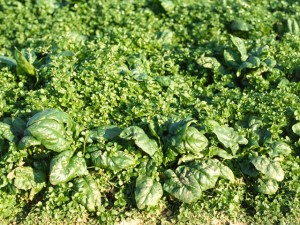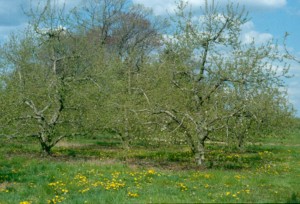Weed Control in matted row strawberries relies heavily on controlling weeds with preemergence herbicides and postemergence herbicides. Weeds are effectively controlled before they germinate or as small seedling growing vegetatively (before flowering). Late winter or early spring after the soil has thawed and winter annual broadleaf weeds have broken dormancy, but before strawberries begin to grow, is a key time for herbicide application. [Read more…]
Weed Control in Spring Seeded Spinach
Spring seeded spinach weed control recommendations are limited to Ro-Neet (if available) and Dual Magnum.
[Read more…]
Weed Control in Overwintered Spinach
Overwintered spinach weed control requires the control of several troublesome winter annual weeds, including chickweed species, mustard species, henbit, and annual bluegrass.
The only postemergence broadleaf herbicide currently recommended and available for use in spinach is Spin-Aid. The rate range for Spin-Aid is 3 to 6 pints per acre, for the control of seedling annual broadleaf weeds.
[Read more…]
Stinger Labeled for Apple Orchards
Stinger has been labeled for weed control stone fruit orchards for years, and is now labeled for use in apple orchards. The weeds controlled fall into two botanical plant families, composites and legumes.
Weed Control Considerations for Early Planted Peas
Peas are planted as early as ground can be worked in late February or early March in the mid-Atlantic states. Planting continues into late April to stagger the harvest. This is especially important for peas grown for processing. Peas planted later, in April, germinate and emerge quickly in the relatively warm soil, but early planted peas emerge more slowly. This exposes the new root and shoot emerging from the seed to the herbicide in the soil for a longer period of time. In addition, the new seedling’s ability to detoxify a herbicide is temperature dependent, working more slowly in cold weather. These conditions make the crop more susceptible to herbicide injury during cold weather that can reduce the stand or delay harvest. [Read more…]
How Rainfall Influences Residual Herbicides
Heavy rains the past month have caused concern that residual preplant incorporated and preemergence herbicide applications may and not provide the length of weed control expected and increase the risk of crop injury compared to when rainfall is closer to average. The affect of the additional rainfall on herbicide activity and crop safety is complex, and is influenced the soil and the chemical properties of each herbicide. [Read more…]


